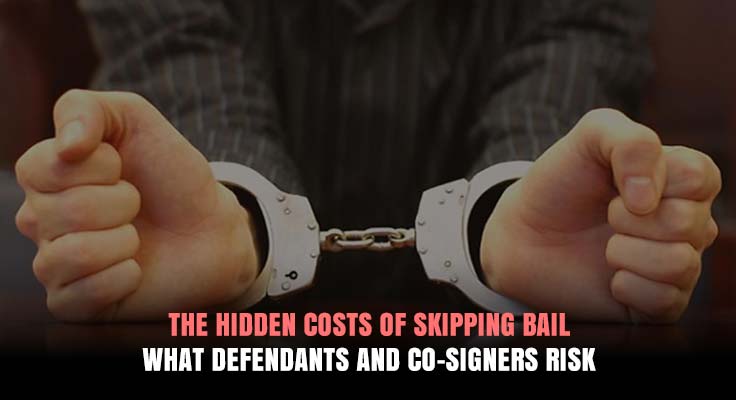The court allows a defendant temporary freedom under the condition that they will appear for all scheduled hearings. Failing to show is called skipping bail or bail jumpingtl. This can have legal and personal consequences. These penalties affect not only the defendant but also the person who secured the bond.
Skipping Bail
Skipping bail occurs when a defendant fails to appear in court after being released on bail. Whether intentional or accidental, missing court breaks the agreement made with the court and the bail bond company. Once the defendant does not show to court, the judge issues a warrant for their arrest.
If the defendant used a cash bond, the full maount paid to the court is not returned. If a bail bond was used, the bail bondsman becomes responsible for paying the full amount of the bail to the court.
Financial Consequences for Co-Signers
When a bail bond is posted, the co-signer guarantees that the defendant will attend all required court appearances. Essentially, they take financial responsibility for the defendant’s actions.
If the defendant skips bail, the co-signer faces immediate financial risk:
● Collateral Loss: If property, vehicles, jewelry, or other assets were used as collateral, they may be seized to cover the bond.
● Owed Balance: The co-signer may be required to pay the full bail amount or reimburse the bail bondsman.
● Additional Fees: Recovery and legal costs, such as hiring bounty hunters or administrative expenses, may also fall on the co-signer.
For many families, the emotional stress of dealing with these consequences can be just as heavy as the financial burden.
Legal Consequences for Defendants
Skipping bail is a criminal offense in itself. Defendants who fail to appear may face:
● Forfeiture of Bail: The bond is revoked, and the defendant loses the right to remain free during the case.
● Additional Charges: Many states treat bail jumping as a separate criminal charge, punishable by fines or even prison time.
● Loss of Credibility: Future bail requests are likely to be denied, meaning the defendant may have to remain in custody until trial.
Additionally, the defendant’s reputation in the legal system can be damaged, which may negatively impact plea negotiations or sentencing outcomes later in the case.
The Role of the Bail Bondsman
When a defendant fails to appear, the bail bondsman is obligated to locate and return them to custody to avoid paying the full bail amount. This can involve fugitive recovery agents who have legal authority to track down and apprehend the defendant.
Conclusion: Accountability Protects Everyone
Skipping bail may seem like a short-term escape, but the consequences are lasting and severe. Defendants risk new criminal charges, loss of freedom, and long-term financial hardship for themselves and their loved ones. For co-signers, the financial and emotional toll can be devastating. Understanding these hidden costs underscores one important truth: honoring bail conditions isn’t just a legal obligation, it’s the best path toward resolving a case responsibly and protecting everyone involved.
Also Read: Bail Bonds and Immigration Holds: What Families Need to Know







